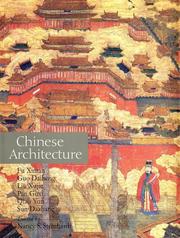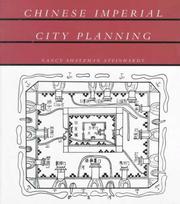| Listing 1 - 10 of 27 | << page >> |
Sort by
|

ISBN: 0300095597 Year: 2002 Volume: *3 Publisher: New Haven London Beijing Yale University Press New World Press
Abstract | Keywords | Export | Availability | Bookmark
 Loading...
Loading...Choose an application
- Reference Manager
- EndNote
- RefWorks (Direct export to RefWorks)
72.032.11 --- 72.03 --- 72.036 --- China --- Chinese architectuur --- Architectuur (geschiedenis) --- Architectuurgeschiedenis --- 20ste eeuw (architectuur) --- Twintigste eeuw (architectuur) --- Architecture --- History. --- History
Book
ISBN: 0674269578 0674269586 9780674269583 Year: 2022 Publisher: Cambridge Harvard University Press
Abstract | Keywords | Export | Availability | Bookmark
 Loading...
Loading...Choose an application
- Reference Manager
- EndNote
- RefWorks (Direct export to RefWorks)
An internationally acclaimed expert explains why Chinese-style architecture has remained so consistent for two thousand years, no matter where it is built. For the last two millennia, an overwhelming number of Chinese buildings have been elevated on platforms, supported by pillars, and covered by ceramic-tile roofs. Less obvious features, like the brackets connecting the pillars to roof frames, also have been remarkably constant. What makes the shared features more significant, however, is that they are present in Buddhist, Daoist, Confucian, and Islamic milieus; residential, funerary, and garden structures; in Japan, Korea, Mongolia, and elsewhere. How did Chinese-style architecture maintain such standardization for so long, even beyond China’s borders? Nancy Shatzman Steinhardt examines the essential features of Chinese architecture and its global transmission and translation from the predynastic age to the eighteenth century. Across myriad political, social, and cultural contexts within China and throughout East Asia, certain design and construction principles endured. Builders never abandoned perishable wood in favor of more permanent building materials, even though Chinese engineers knew how to make brick and stone structures in the last millennium BCE. Chinese architecture the world over is also distinctive in that it was invariably accomplished by anonymous craftsmen. And Chinese buildings held consistently to the plan of the four-sided enclosure, which both afforded privacy and differentiated sacred interior space from an exterior understood as the sphere of profane activity. Finally, Chinese-style buildings have always and everywhere been organized along straight lines. Taking note of these and other fascinating uniformities, The Borders of Chinese Architecture offers an accessible and authoritative overview of a tradition studiously preserved across time and space.
Architecture, Chinese --- Architectural design --- Religious architecture --- Spiritual architecture --- Architecture --- Design --- Structural design --- Chinese architecture --- History. --- China --- East Asia --- Boundaries. --- Civilization --- Chinese influences. --- S17/1600 --- History --- China: Art and archaeology--Architecture

ISBN: 0824821963 058533109X 0824841476 Year: 1990 Publisher: University of Hawaii Press
Abstract | Keywords | Export | Availability | Bookmark
 Loading...
Loading...Choose an application
- Reference Manager
- EndNote
- RefWorks (Direct export to RefWorks)
City planning --- History
Book
ISBN: 9780674241015 Year: 2022 Publisher: Cambridge, Massachusetts : Harvard University Press,
Abstract | Keywords | Export | Availability | Bookmark
 Loading...
Loading...Choose an application
- Reference Manager
- EndNote
- RefWorks (Direct export to RefWorks)
"Chinese architecture is astonishingly uniform. Buddhists, Daoists, and Muslims, inside China and beyond, built Chinese-style structures the same way for two thousand years, despite mastering new technologies along the way. Nancy Shatzman Steinhardt offers an authoritative overview of design principles that have stood the test of time-and geography"--
Architectural design --- Architectural design. --- Architecture, Chinese --- Architecture, Chinese. --- Boundaries. --- Civilization --- Religious architecture --- Religious architecture. --- History --- Chinese influences. --- China --- China. --- East Asia --- East Asia.

ISBN: 9780824812447 9780824821968 Year: 1999 Publisher: Honolulu, Hawaii University of Hawai'i Press
Abstract | Keywords | Export | Availability | Bookmark
 Loading...
Loading...Choose an application
- Reference Manager
- EndNote
- RefWorks (Direct export to RefWorks)
Book
ISBN: 0824812441 Year: 1990 Publisher: Honolulu University of Hawaii press
Abstract | Keywords | Export | Availability | Bookmark
 Loading...
Loading...Choose an application
- Reference Manager
- EndNote
- RefWorks (Direct export to RefWorks)
City planning --- History
Book
Year: 1997 Publisher: Honolulu University of Hawaii press
Abstract | Keywords | Export | Availability | Bookmark
 Loading...
Loading...Choose an application
- Reference Manager
- EndNote
- RefWorks (Direct export to RefWorks)
Book
ISBN: 9780691240169 Year: 2024 Publisher: Princeton Princeton University Press
Abstract | Keywords | Export | Availability | Bookmark
 Loading...
Loading...Choose an application
- Reference Manager
- EndNote
- RefWorks (Direct export to RefWorks)
"In Xanadu did Kubla Khan A stately pleasure-dome decree: Where Alph, the sacred river, ran Through caverns measureless to man Down to a sunless sea. (Samuel Taylor Coleridge, 1797) One of the most often-quoted of Coleridge's verses, the stanza above does not describe an imaginary or fantastical place. Xanadu, more commonly known as Shengdu, was the summer capital of the Yuan Dynasty of China (1267-1368), built at the height of Mongol rule in Asia. Kublai Khan was the fifth emperor of the Mongol Empire, and founder of the Yuan dynasty. The significant trove of extant Yuan-period works of art and architecture-including sculpture, paintings, temples, and cities-has remained inaccessible to western scholars for decades. Yuan: Chinese Architecture, Mongol Rule is Nancy Steinhardt's career-spanning and meticulous research, enriched by extensive recent fieldwork, and offers the first comprehensive study of the cultural legacy and artistic impact of Mongolian rule on Chinese art and architecture. Steinhardt explores architecture in China and at China's borders during Mongol rule in relation to space, ritual, context, and aesthetics, four issues that have particular importance during the Yuan period but are significant throughout Chinese architectural history. She discusses the architecture that the Mongols encountered along their routes of conquest, and uses the Yutu atlas and Shilin guangji encyclopedia to understand how the Mongols placed cities and palaces in the empire they envisioned as theirs. She examines religious monuments and buildings of all faiths in China at the time, including places for Buddhist, Daoist, Confucian, Christian, Islamic, Brahmanical, and Manicheaean rituals. She examines tombs, mansions, and a humble residence, and she tries to articulate a Mongolian aesthetic based on the parts of their empire that included Japan, Korea, Mongolia, Russia, and Iran. In doing so, Steinhardt refutes the idea that the Mongols had no impact on Chinese architectural history, or that Chinese architecture became rigid and derivative after the Yuan dynasty. Drawing on textual sources in numerous languages as well as field studies covering territory from Iran in the East to Korea in the West, Steinhardt's Yuan: Chinese Architecture, Mongol Rule will become the standard text about this critical period of cultural and artistic interaction"--
Book
ISBN: 9780824841478 Year: 2022 Publisher: Honolulu
Abstract | Keywords | Export | Availability | Bookmark
 Loading...
Loading...Choose an application
- Reference Manager
- EndNote
- RefWorks (Direct export to RefWorks)
Book
ISBN: 9780824846350 Year: 2023 Publisher: Honolulu
Abstract | Keywords | Export | Availability | Bookmark
 Loading...
Loading...Choose an application
- Reference Manager
- EndNote
- RefWorks (Direct export to RefWorks)
| Listing 1 - 10 of 27 | << page >> |
Sort by
|

 Search
Search Feedback
Feedback About UniCat
About UniCat  Help
Help News
News